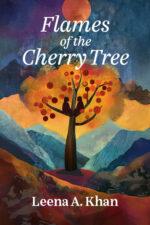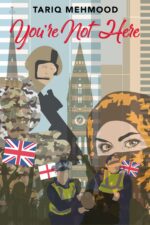-
Flames of the Cherry Tree
USD $ 12.00 USD $ 22.00Price range: USD $ 12.00 through USD $ 22.00Select options This product has multiple variants. The options may be chosen on the product pageFlames of the Cherry Tree
USD $ 12.00 USD $ 22.00Price range: USD $ 12.00 through USD $ 22.00In the majestic valley of pre-Partition Kashmir, Aafreen Khan dreams of becoming a doctor like her beloved grandfather. Fierce, curious, and headstrong, she defies the boundaries of convention as a Muslim and a woman in a country rigged against her, determined to carve her own path. But as the partition of India looms closer and Kashmir finds itself in the crossfire, Aafreen is swept into the whirlwind of a story much larger than her own. When love, loss, and political upheaval reshape her entire world, Aafreen is forced to confront everything she thought she knew.Spanning decades and generations, Flames of the Cherry Tree is a sweeping, intimate portrait of a young woman’s coming-of-age against the backdrop of colonialism, rebellion, and the violent birth of today’s occupied Kashmir. At once tender and unflinching, it traces the story of one Kashmiri family through oppression and resistance, illuminating the forgotten histories that have shaped Kashmir and the hope that survives in its people.
This book is for readers of historical fiction that crave a deeper understanding of places too-often lost under the narrative of their tyrants. Flames of the Cherry Tree is a vivid, devastating, and ultimately life-affirming tale of the ties that bind us across time.
Select options This product has multiple variants. The options may be chosen on the product page -
Beside the Sickle Moon: A Palestinian Story
From: USD $ 5.00Select options This product has multiple variants. The options may be chosen on the product pageBeside the Sickle Moon: A Palestinian Story
From: USD $ 5.00Beside the Sickle Moon is near future literary activism based on Israel’s occupation of Palestine. The story tells a first person narrative through Laeth Awad, a Palestinian who lives above his convenience store experiencing days pass through smoke clouds with his cousin Aylul. One night upon returning to their village from Ramallah they encounter an Israeli checkpoint within the buffer zone that hadn’t been there before. It isn’t long until the two stumble upon Israel’s plans to construct a luxury hotel for incoming settlers, Ma’al Luz. Demolition crews and military personnel are due to fulfill this contract in the months to come and with them as overseer is the infamous Meir Cohen, a Mossad operative who played a key role in the fall of Gaza.
Aylul believes from their father, an Al Qassam militant who died in the battle for Jericho, that only the threat of annihilation breeds the best of human action. They use their contacts to connect with the factions, who grant them strength to defend their village from occupation. With these resources in hand Aylul forms Al Mubarizun, a group crowning themselves Palestine’s final resistance.
Laeth doubts the existence of a future, lost in philosophical ambivalence as he tries to follow his cousin into the depths of guerrilla warfare. He questions the futility of resistance when all former allies have normalized relations with Israel. And what of the innocents on the other side of the Wall who had no say in where they were born? Though a minority of the population, he is not alone in this sentiment. Palestinian youth begin to empathize with this logic enough to create a new social movement, the Forgotten Ones. Coining the derogatory term that their critics slung, the NGO advocates for a peaceful transition to Israel’s colonization where most Palestinians hear whimpers of surrender.
Set in a hauntingly plausible future, where Israel has marked a century of Palestinian occupation … As a novel of the future, Beside the Sickle Moon is, unsurprisingly, preoccupied with temporality, attempting to reconcile the vastness of macro-historical events with the immediacy of everyday life. … One of the most chilling features of Husien’s novel as history is the world’s renewed abandonment of Palestine. In a future of systemic global crisis, nations have closed ranks and shut their eyes. Israeli mines run on the slave labor of Palestinian captives, and refugee camps have become invisibilized death zones … — Londiwe Gamedze https://africasacountry.com/2024/11/reading-the-present-as-history
Select options This product has multiple variants. The options may be chosen on the product page -
The Second Coming
USD $ 10.00 USD $ 22.00Price range: USD $ 10.00 through USD $ 22.00Select options This product has multiple variants. The options may be chosen on the product pageThe Second Coming
USD $ 10.00 USD $ 22.00Price range: USD $ 10.00 through USD $ 22.00
In the remnants of a fractured UK, England is on the brink of collapse where far-right militias rise to power. As Islamophobia and English nationalism ignite brutal violence, 19-year-old Marah Sultana is thrust into a fight for survival. Hunted by forces seeking control, she carries a secret powerful enough to change the course of the war—and the future of the world. In a world in which America’s reign as a superpower has crumbled, its mercenaries now rule in its shadow,In The Second Coming, Tariq Mehmood delivers a searing, unflinching narrative that mirrors his own lifelong struggle for justice. This novel is not just fiction—it’s a reflection of real-world battles. Mehmood’s powerful storytelling compels readers to confront uncomfortable truths while offering a gripping, emotional journey of resistance and survival.
A dystopian desi mash-up of The Handmaid’s Tale, Clockwork Orange, and V for Vendetta. The Second Coming warns of the dangers of right-wing nationalism and white supremacy and imagines where such hate could take England if it is not, somehow, nipped in the bud. — Paul Cochrane, journalist, Middle East Eye
A must-read dystopian fantasy about race, religion, and love. Unmissable – Melvin Burgess, novelist, winner of the Carnegie Medal and the LA prize for Teenage Fiction
An unforgettable novel, both vivid and nightmarishly plausible. — Peter Kalu, novelist, storyteller, playwright and poet.
A story of resilience and hope told against the brutal realities of patriarchy and colonial violence.
— Amrit Wilson, activist, feminist, and author of Finding a Voice: Asian Women in Britain (Daraja Press)Select options This product has multiple variants. The options may be chosen on the product page -
Bongoman and the Aliens
USD $ 16.25Select options This product has multiple variants. The options may be chosen on the product pageBongoman and the Aliens
USD $ 16.25There have been a series of mysterious disappearances within Bongoman’s tranquil Eastlands Estate in Nairobi’s urban sprawl. The missing persons reappear days later with no recollection of where they have been and with altered personalities. In the course of his investigations, Bongoman bumps into an alien being who is also looking for him to enlist his services to help in fighting another alien race, building a force to annihilate humankind and take over the earth. Bongoman’s scepticism about the existence of aliens is tested as he finds himself forming an alliance of convenience with a star-hopper from a race that can move through dimensions and journey across space at will. Bongoman and his alien partner find themselves in a desperate race against time as they take on an aggressive race of aliens with seemingly invincible powers as they seek to undo what has been done and rid the world of this super race of invaders. In the war to save the world, the duo has to deal with aliens who have taken over the ‘essence’ of human beings and have mingled with the population. Bongoman must single them out and expel the alien within to save the poor souls.Select options This product has multiple variants. The options may be chosen on the product page -
Slave King: Rebels against empire: A Novel
USD $ 5.00 USD $ 26.00Price range: USD $ 5.00 through USD $ 26.00Select options This product has multiple variants. The options may be chosen on the product pageSlave King: Rebels against empire: A Novel
USD $ 5.00 USD $ 26.00Price range: USD $ 5.00 through USD $ 26.00In thirty chapters, the narrative develops the incredible story of how a boy (Younis/Eunus/Euno) captured as a slave in Afamia, Syria challenges the Roman Empire in Sicily, circa 140-132 BCE. The chapters dramatize the circumstance of his capture, his experiences as a tutor, the growth of his prophetic and magical abilities, events that fomented the uprising (cruelties, rapes, crucifixions), the role of female characters, connections to other historical events (e.g., the destruction of Carthage), as well as scenes of an exorcism, an ancient marriage ceremony, a play performed outside a besieged city, and several battles against the Roman legions. An epilogue by an imagined contemporary narrator, who explains why she wrote the novel, ends the work. In the chapters and epilogue, while using ancient sources to some extent (sparse and biased as they are), the work departs from them to resolve contradictions, fill in gaps, and present an alternative narrative of historical and cultural issues. It’s intended to remedy the neglect of this story in both ancient and modern sources, reverse the demonization explicit and implicit in them, and remedy the imbalance in the dominant constructs. It promotes the event as significant, certainly just as important as (if not more than) the Spartacus rebellion seven decades afterwards, or others that are commonly recounted. A significant aspect of this revolt comes from the fact that Younis was able to forge a coalition of slaves, farmers and herders that defeated Roman armies and established an independent entity on more egalitarian principles. The novel also touches on a range of topics, such as prophecy, magic, languages, the construct of Western civilization, representation of regional cultures, customs, and mythologies. An idealized statue of this rebel stands today in Enna, Sicily, along with an inscription that seems designed to appeal to tourists, yet Younis’ rebellion contradicts the dominant notions promoted in Italy and throughout the West, especially the identification with imperial Rome. This novel is intended to remedy his legacy. A fictionalised account of a slave rebellion in Roman Sicilia more than sixty years before Spartacus, it tells the story of the slave Younis from Afamia (now in Syria), a mystic and seer who led a great uprising sustained much longer than Spartacus’.
Select options This product has multiple variants. The options may be chosen on the product page -
You’re Not Here
USD $ 5.00 USD $ 20.00Price range: USD $ 5.00 through USD $ 20.00Select options This product has multiple variants. The options may be chosen on the product pageYou’re Not Here
USD $ 5.00 USD $ 20.00Price range: USD $ 5.00 through USD $ 20.00One brother goes missing in action in Afghanistan, the other falls in love with an Afghan girl in England.
Bitter divisions engulf an English town where young Muslims oppose the British army’s presence in Afghanistan, whilst white youth condemn the Muslims as traitors.
To the disgust of his white friends, 17-year-old Jake Marlesden, whose brother is missing in action in Afghanistan, is in love with Leila Khan, an Afghan. When Jake tries to find out what happened to his brother, neighbour turns against neighbour and lover against lover.
Leila joins young Muslims protesting against the returning bodies of dead British soldiers, and Jake stands with the families of the soldiers. The lovers fall apart.
But far off events, and sinister forces at home, bring the lovers together again in a journey in which they will not only discover themselves, but also heal the wounds of their families and friends.
This is the sequel to You’re Not Proper.
Select options This product has multiple variants. The options may be chosen on the product page









